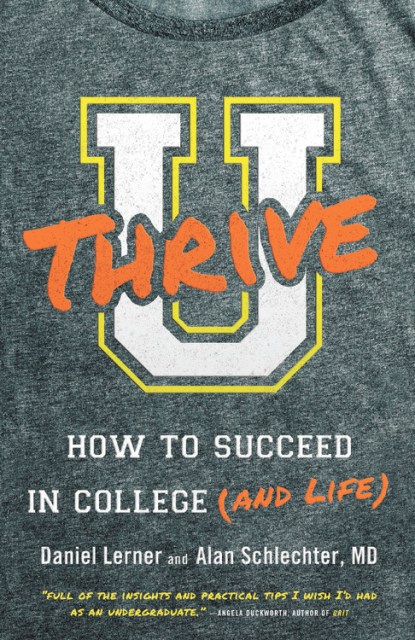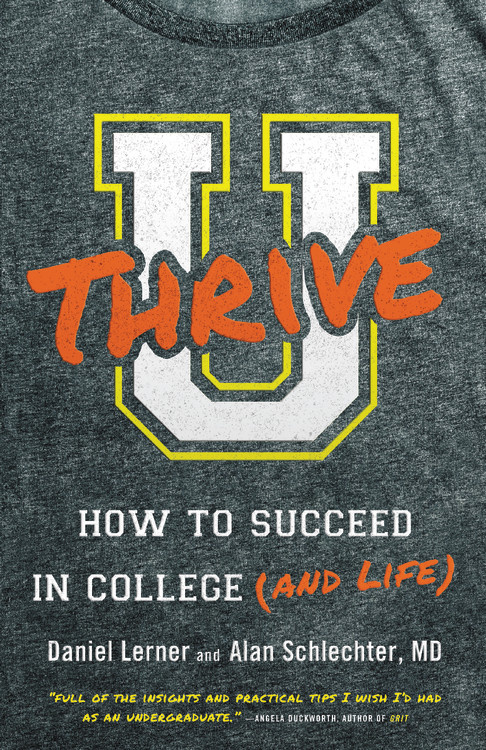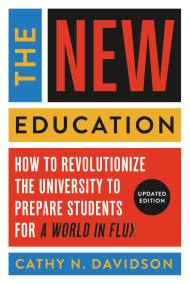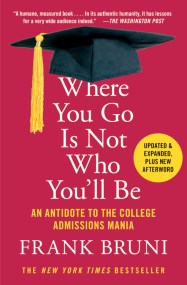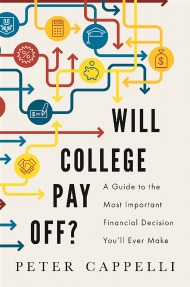Promotion
Shop now and save 20% on your back-to-school purchases & get free shipping on orders $45+ Use code: SCHOOL24
U Thrive
How to Succeed in College (and Life)
Contributors
By Dan Lerner
Formats and Prices
Price
$18.99Price
$23.99 CADFormat
Format:
- Trade Paperback $18.99 $23.99 CAD
- ebook $9.99 $15.99 CAD
- Audiobook Download (Unabridged)
This item is a preorder. Your payment method will be charged immediately, and the product is expected to ship on or around April 18, 2017. This date is subject to change due to shipping delays beyond our control.
Also available from:
From the professors who teach NYU’s most popular elective class, “Science of Happiness,” a fun, comprehensive guide to surviving and thriving in college and beyond.
Every year, almost 4,000,000 students begin their freshman year at colleges and universities nationwide. Most of them will sleep less and stress out a whole lot more. By the end of the year, 30% of those freshmen will have dropped out. For many, the unforeseen demands of college life are so overwhelming that “the best four years of your life” can start to feel like the worst.
Enter Daniel Lerner and Dr. Alan Schlechter, ready to teach students how to not only survive college, but flourish in it. Filled with fascinating science, real-life stories, and tips for building positive lifelong habits, U Thrive addresses the opportunities and challenges every undergrad will face — from finding a passion to dealing with nightmarish roommates and surviving finals week. Engaging and hilarious, U Thrive will help students grow into the happy, successful alums they all deserve to be.
Every year, almost 4,000,000 students begin their freshman year at colleges and universities nationwide. Most of them will sleep less and stress out a whole lot more. By the end of the year, 30% of those freshmen will have dropped out. For many, the unforeseen demands of college life are so overwhelming that “the best four years of your life” can start to feel like the worst.
Enter Daniel Lerner and Dr. Alan Schlechter, ready to teach students how to not only survive college, but flourish in it. Filled with fascinating science, real-life stories, and tips for building positive lifelong habits, U Thrive addresses the opportunities and challenges every undergrad will face — from finding a passion to dealing with nightmarish roommates and surviving finals week. Engaging and hilarious, U Thrive will help students grow into the happy, successful alums they all deserve to be.
-
"U Thrive is full of the insights and practical tips I wish I'd had as an undergraduate. It's a user's guide to the mind and body, written for young adults on the cusp of mastering both!"Angela Duckworth, author of Grit
-
"This book is full of information that college students need -- not just for achieving excellence, but also for reducing stress, gaining happiness, and finding meaning."Adam Grant, author of Originals and Give and Take
- On Sale
- Apr 18, 2017
- Page Count
- 304 pages
- Publisher
- Little Brown Spark
- ISBN-13
- 9780316311618
Newsletter Signup
By clicking ‘Sign Up,’ I acknowledge that I have read and agree to Hachette Book Group’s Privacy Policy and Terms of Use
